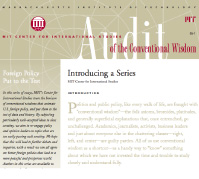Audits of the Conventional Wisdom
The Audit publication tours the horizon of conventional wisdoms that animate U.S. foreign policy, and puts them to the test of data and history. By subjecting particularly well-accepted ideas to close scrutiny, we aim to re-engage policy and opinion leaders on topics that are too easily passing such scrutiny. We hope that this will lead to further debate and inquiries, with a result we can all agree on: better foreign policies that lead to a more peaceful and prosperous world.
Authors in this series are available to the press and policy community. For more information, contact Michelle English at english7@mit.edu / 617-253-1965.
Audits |
|---|
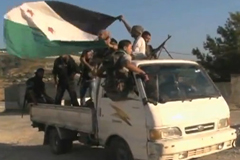 |
Debating US interests in Syria's civil warBrian Haggerty, MITSeptember 16, 2013 In the aftermath of a chemical attack in the suburbs of Damascus on August 21, President Obama's threat to launch a limited cruise missile strike to "deter and degrade" Syrian President Bashar al-Asad's chemical weapons capability has once again thrust U.S. Syria policy to the forefront of national debate. |
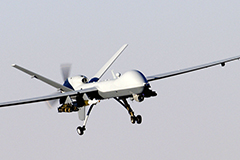 |
Attack of the drones: ethical, legal and strategic implications of UAV use Lena Simone Andrews, MITFebruary 16, 2013 The United States has dramatically increased the development, acquisition, and use of unmanned aerial vehicles (UAVs). As these systems have grown, a chorus of skeptics has raised questions about the tactical, ethical, and strategic implications of this technology. |
 |
Nobody’s century: the American prospect in post-imperial timesAmbassador Chas W. Freeman (USFS, Ret.)September 1, 2012 We are entering a novel period in our history–one in which the United States will be both fiscally constrained and also unable to call the shots in many places around the globe. Let me try to set the stage for your discussions by raising some difficult questions for you to ponder. |
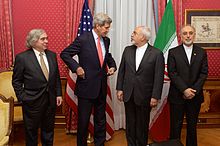 |
Improving Iran-US relationsAbbas Maleki, CIS Robert E. Wilhelm FellowJune 28, 2012 Abbas Maleki was in residence at CIS as a Robert E. WIlhelm Fellow. He is assistant professor of political science at Sharif University of Technology in Tehran, director of the International Institute for Caspian Studies, and senior associate of the Belfer Center's International Security Program. He was Iran's deputy foreign minister from 1988–1997. |
 |
Future of the euro: threats and opportunitiesMarco Mazzucchelli and David Singer, MITApril 23, 2012 David Andrew Singer, associate professor of political science at MIT, discusses the future of the euro with Marco Mazzucchelli, visiting scholar, MIT Sloan. |
 |
Cutting aid to Africa won't help gay rights Jackee Budesta Batanda, MITFebruary 12, 2012 Jackee Budesta Batanda was in residence at CIS as a Elizabeth Neuffer Fellow. She is a Ugandan journalist, writer, and entrepreneur. She is a senior managing partner with Success Spark Brand Limited, a communications and educational company, and a co-founder of Mastermind Africa Group Limited, a business-networking group. |
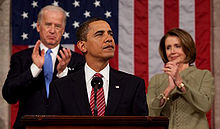 |
Obama's strategy towards Afghanistan, Pakistan, and South AsiaPaul Staniland, MITJune 4, 2010 The series Audit of the Conventional Wisdom continues with a look at the Obama administration's strategy towards Afghanistan, Pakistan, and South Asia. Paul Staniland, a PhD candidate in the Department of Political Science at MIT and a member of the Center's Security Studies Program is featured. In fall 2010, Staniland will join the University of Chicago as assistant professor of political science. |
 |
Artificial life: a global good or evil? Kenneth Oye, MITMay 28, 2010 The Center's series continues with a look at the recent discovery out of the Venter laboratory: artificial life. Is this a global good or evil? Ken Oye, director of the Center's Program on Emerging Technologies and associate professor of political science and engineering systems, discusses the discovery from his MIT office. |
 |
Why is the defense budget so big? Benjamin Friedman, MITApril 2, 2010 The Center's Audit of the Conventional Wisdom series continues with an analysis of the defense budget—the largest since World War II. Is it a rational response to the threats and the dangers that the United States faces—or not? Benjamin Friedman is a PhD student at the MIT Department of Political Science. He is a member of the Center's Security Studies Program and is a research fellow in defense and homeland security studies at the Cato Institute. |
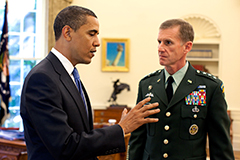 |
Afghanistan: elections, McCrystal report, & the Taliban Fotini Christia, MITOctober 22, 2009 The Center's Audits of the Conventional Wisdom series continues with Fotini Christia on Afghanistan. Fotini is an assistant professor at the Department of Political Science at MIT. |
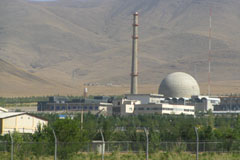 |
Iran’s nuclear program: a race between sanctions and centrifuges? Jim Walsh, MITSeptember 23, 2009 The Center's Audits of the Conventional Wisdom series continues with Jim Walsh on Iran. Walsh is an international securities expert and research associate at the Center's Security Studies Program. |
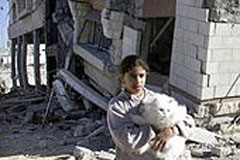 |
Multilateral imposition: an immodest proposal for the Israeli-Palestinian conflict Michael Barnett, University of MinnesotaJuly 14, 2009 Which is more likely in the next five years: that the Israelis and Palestinians negotiate a peace agreement or that they continue a “status quo” that turns into an accidental suicide pact? The safe bet is suicide. |
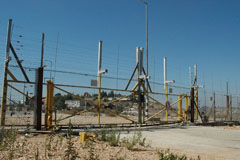 |
Israel-Palestine: great expectations or misplaced euphoria?Anat Biletsky, MITJuly 10, 2009 Anat Biletski audits President Obama's speech in Cairo and Prime Minister Netanyahu's counter-speech in Israel. Anat Biletski is professor of philosophy at Tel Aviv University. She is the former chair of B'Tselem and a research affiliate at the MIT Center for International Studies. |
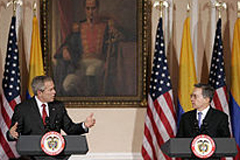 |
US and Colombia: a growing military intervention? Jenny Manrique Cortés, MITDecember 1, 2008 Colombia is one of the closest friends of American foreign policy. A country of 44 million, Colombia has been fighting for years against two scourges that have turned into primordial interests for the US: drug trafficking and terrorism. |
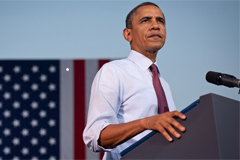 |
Recovering the liberal foreign policy tradition Nick Bromell, University of Massachusetts, and John Tirman, MITNovember 1, 2008 Over the course of the seemingly endless 2008 electoral campaign, Barack Obama chose not to formulate a coherent and distinctive foreign policy. Aside from calling for a redeployment of military resources from Iraq to Afghanistan and expressing a greater willingness to open talks with countries like Iran, he never explained to voters exactly how he would manage foreign affairs differently from John McCain or, for that matter, from George W. Bush. |
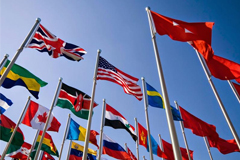 |
State-building and US foreign policy Jeremy Allouche, University of OxfordNovember 1, 2008 Since the early 1990s, state-building has become an important objective of American foreign policy. This can be explained by the fact that failed states have been perceived since the end of the Cold War as a major security concern. Under the Clinton administration, failed states were qualified as major threats to global security. |
 |
The global financial crisis and obstacles to US leadership David A. Singer, MITOctober 15, 2008 We are in the midst of a global financial crisis. The U.S. “sub-prime” crisis, which triggered some of the largest bank failures in U.S. history, has now spread in earnest to Europe and Asia. Bank failures around the globe are likely to continue as housing markets collapse and credit markets run dry. |
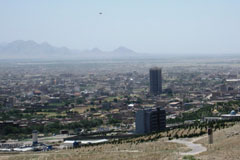 |
The US and Iran in Afghanistan: policy gone awry Barnett Rubin with Sara Batmanglich, New York UniversityOctober 1, 2008 Afghanistan is one of several contexts in which the long-term common interests of the U.S. and Iran have been overshadowed by the animus originating in the 1953 CIA-led coup in Iran and the Iranian revolution of 1979, to the detriment of the interests of the U.S., Iran, and Afghanistan. |
 |
Does the “surge” explain Iraq’s improved security? September 1, 2008 There is a general consensus that the “surge” of additional troops into Iraq has been responsible for the significant decrease of violence in Iraq. Sen. John McCain has long advocated “sustained and substantial” troop increases, attacking Sen. Barack Obama’s position on drawing down forces. Obama for his part recently stated that the surge has “succeeded in ways that nobody anticipated” and “beyond our wildest dreams.” |
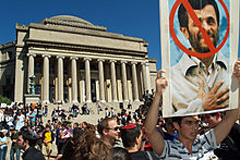 |
Iran-US: the case for transformation Sanam Anderlini and John Tirman, MITSeptember 1, 2008 Thirty years of enmity, disruption, and brinksmanship have yielded very little worthwhile in the relationship between Iran and the United States. The policies in both capitals toward the other are essentially bankrupt and dysfunctional. Each clings to their quiver of grievances against the other, letting the past dictate the future to the detriment of both countries. |
 |
Turkey’s crisis and future Dogu Ergil, Ankara UniversityAugust 1, 2008 The two trials that have been occupying the Turkish national agenda today are likely to be the milestones of Turkey’s ability to rid itself of an opaque regime shaped under bureaucratic tutelary. |
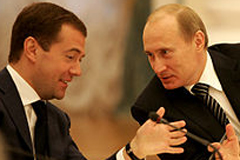 |
Who leads Russia? Elizabeth Wood, MITJune 1, 2008 Ever since Dmitri Medvedev’s nomination to succeed Vladimir Putin as president of Russia, followed by his election and now his inauguration, Kremlin watchers, both Russian and Western, have been discussing the so-called “Putin-Medvedev tandem” and asking who will really lead Russia. Is the duumvirate stable? Will it degenerate into squabbling among the Kremlin clans behind the scenes? |
 |
Insights into two American empires Alice Amsden, MITMay 1, 2008 In Escape from Empire: The Developing World ’s Journey through Heaven and Hell (MIT Press, 2007), Alice Amsden tartly takes on much of the conventional wisdom about the global economy. In this interview, she briefly touches on a few of the book’s provocative themes. |
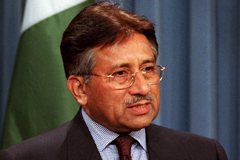 |
Pakistan’s governance imperative May 1, 2008 After the kind of year that no country ever wants, with its government in crisis, repression replacing even the most remote notion of good government, political assassination, and terror standing in the wings, Pakistan elected a new parliament in February. Led initially by a coalition of three parties previously deemed outcasts by President Pervez Musharraf, its cabinet of familiar political faces quickly agreed in principle, and at least in public, on a compelling and daunting political agenda. |
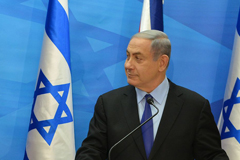 |
Much ado about nothing: the Israeli-Palestinian peace process Anat Biletzki, MITMay 1, 2008 Two myths have been with us for a while now; one is of lasting permanence, the other has gained traction more recently. The first is that the way to get out of the Israeli-Palestinian imbroglio is by engaging in a “peace process,” and the second is that the result of that peace process is pretty much well-known. . |
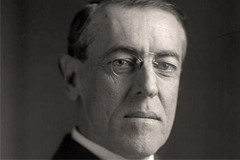 |
Wilson’s radical vision for global governance Ezra Manela, Harvard UniversityApril 1, 2008 In recent years, Woodrow Wilson has returned to feature prominently in the public discourse on the role of the United States in the world. For students of U.S. foreign relations, this is hardly a surprising development. Wilson was responsible for articulating a vision of the U.S. role in the world—usually described as “liberal internationalism”—that has remained, despite well-known flaws and scores of critics over the years, dominant in shaping American rhetoric and self-image, if not always policies, vis-à-vis the rest of the world. |
 |
Good and bad news on global development Dani Rodrik, Harvard UniversityApril 1, 2008 I start with some good news, because there is, I think, a lot of good news in the world of development. Then I want to present what I think is essentially a paradox. The paradox, to put it very crudely, is that while economic development is working, development policy is not. |
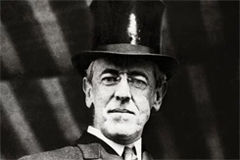 |
Wilson, Bush, and the evolution of liberal foreign policy Tony Smith, Tufts UniversityApril 1, 2008 The first subject to discuss in considering the future of the liberal internationalist agenda is the importance of the democratization project to the definition of Wilsonianism. The second is the meaning of multilateralism. In the first case, Thomas Knock and Anne-Marie Slaughter argue in a forthcoming volume that democratization was never an important part of Wilsonianism; that, instead, multilateralism is the key to liberal internationalism. |
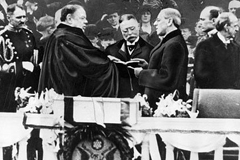 |
Wilson and the founders: the roots of liberal foreign policy Ted Widmer, Brown UniversityApril 1, 2008 We can’t do much better than reclaiming the Declaration of Independence as a fundamental foreign policy document in American history. We have a tendency to read it in a simplistic way, and to think of it only as a sort of airy declaration of what were then human rights, and a declaration of separation from England. |
 |
A solution for the US–Iran nuclear standoff William Luers, Thomas R. Pickering, and Jim WalshMarch 1, 2008 The recent National Intelligence Estimate’s conclusion that Tehran stopped its efforts to develop nuclear weapons in 2003, together with the significant drop in Iranian activity in Iraq, has created favorable conditions for the US to hold direct talks with Iran on its nuclear program. |
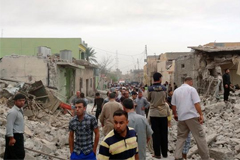 |
Iraq's three civil wars Juan Cole, University of MichiganFebruary 1, 2008 All war situations are a little bit opaque, but from reading the Iraqi press in Arabic, I conclude that there are three major struggles for power of a political and violent sort. What's striking is how little relevant the United States is. |
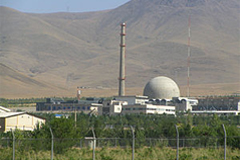 |
The US and Iran after the NIE Farideh Farhi, University of HawaiiDecember 1, 2007 The release of the National Intelligence Estimate regarding Iran’s nuclear capabilities, intentions, and policies created shock waves as well as sighs of relief in Washington and elsewhere. The assessment that Iran stopped its weapons program in 2003, and that its declared enrichment program cannot be converted as easily or as quickly as assumed for use in a military program, immediately brought into question the notion that Iran’s nuclear program needs to be dealt with immediately and only through coercive mechanisms. |
 |
Russia: an energy superpower? Carol Saivetz, MITDecember 1, 2007 As Vladimir Putin nears the end of his second term as Russian president, it is clear that energy exports have become a major component of a resurgent Russia’s foreign policy. According to the conventional wisdom, Russia’s vast resources make it a superpower to be reckoned with. |
 |
Russia and America: is another arms race afoot? Jane MO Sharp, Kings College LondonNovember 1, 2007 During the Cold War years we learned that successful arms control agreements with the Soviet Union were those that codified parity, or at least a mutually acceptable status quo. After the collapse of the Soviet Union and the Warsaw Treaty Organization (WTO) in 1991, a much diminished Russia saw all its WTO allies and three former Soviet republics join NATO, making parity harder to achieve. |
 |
Is Port Security funding making us safer? Veronique de Rugy, George Mason UniversityNovember 1, 2007 The most terrifying security threat to security experts and the public alike is nuclear proliferation. Once the figment of Hollywood imagination, the ultimate nightmare scenario that is discussed by some as inevitable is the detonation of a nuclear device on American soil. |
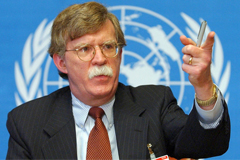 |
Who failed whom? Assessing the UN’s human rights efforts Balakrishnan Rajagopal, MITOctober 1, 2007 Several months ago, during the finalization of the plan to replace the United Nations’ Commission on Human Rights with the new UN Human Rights Council, John Bolton, the U.S. ambassador to the UN, said with characteristic flourish, “We want a butterfly..." |
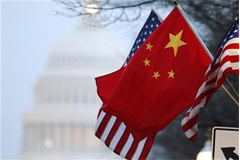 |
Distracted at the creation: Washington’s China policy Christopher P. Twomey, Naval Postgraduate SchoolOctober 1, 2007 U.S. China policy in the beginning of the twenty-first century is greater than the sum of diplomatic initiatives and presidential statements. Since China’s rise is reshaping global politics, U.S. policy should be evaluated in this larger context. Washington must not only handle its relationship with China on a day-to-day basis, but must also lay the foundations for a long-term response to its rise.
|
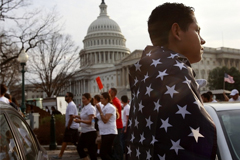 |
Immigration reform: failure and prospects Tara Magner, National Immigrant Justice CenterSeptember 1, 2007 The debate over immigration reform in America has come full circle. It began in late 2005 with an “enforcement only” bill in the House of Representatives that relied on aggressive implementation of existing law and greatly restricting future immigration. The most extreme legislation proposed in this vein would have made felons of undocumented immigrants and prosecuted those who provide such immigrants with aid or comfort. |
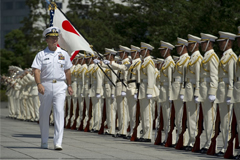 |
'New fighting power!' for Japan? Richard Samuels, MITSeptember 1, 2007 Japanese strategists struggled for decades to find a way to field a robust military despite legal, political, and normative constraints on the expansion of the Self-Defense Forces (SDF). Their progress was steady and significant, but slow. Now, leveraging off (and playing up) a perceived shift in the nature of the threat Japan faces, they have found a less constrained and highly efficacious route to force transformation. |
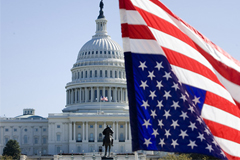 |
Is the foreign policy process working? John Tirman, MITSeptember 1, 2007 For decades, political analysts have dissected the mechanisms in the U.S. government and other institutions to describe how foreign policy is made. The matter seems to rise with international crises, and those are upon us again: the Iraq and Afghanistan wars, the confrontation with Iran, HIV/AIDS, and the pressures of climate change, among other issues, underscore the point. |
 |
Iran-Pakistan-India pipeline: Is it a peace pipeline? Abbas Maleki, International Institute for Caspian Studies (Tehran)September 1, 2007 A major natural gas pipeline that would stretch from the fields of southern Iran to Pakistan and India—itself a remarkable prospect—is being planned. But it faces serious hurdles, not least the fierce opposition of the U.S. government. |
 |
Pax mercatoria: does economic interdependence bring peace? PR GoldstoneAugust 1, 2007 Do high levels of international trade lead to peace? Norman Angell authored the best-selling book on international politics in history, arguing that economic interdependence between Germany and England made any war between the two unthinkable—an illusion. |
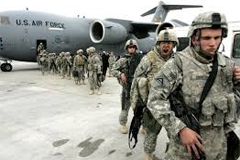 |
Fewer missions, not more troops Benjamin H Friedman, MITJuly 1, 2007 A bipartisan consensus wants to expand the American ground forces. But the expansion serves a failed strategy that relies on military occupations and state-building to fight terrorism. A better strategy is to avoid these missions and the troop expansion. |
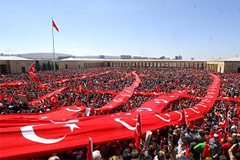 |
Turkey: misperceptions and the healing touch of democracy Dogu Ergil, Ankara UniversityMay 1, 2007 Mass demonstrations in late April brought out hundreds of thousands of people in Ankara and perhaps a million people one week later in Istanbul, an awesome scene on both occasions. Demonstrations of lesser scale are underway in smaller cities like Canakkale and Manisa—a trend to continue until early elections scheduled for July 22. |
 |
Internally displaced populations: the paradox of national responsibility Francis M DengMay 1, 2007 The general assumption of the international system is that those who have been forced to flee from their countries of origin due to conflict, human rights abuse and persecution, and have crossed international borders and become refugees, have lost the protection of their own governments and are therefore the legitimate concern of the international community.
|
 |
Paying for homeland security: show me the money Cindy Williams, MITMay 1, 2007 In January 2003, the Bush administration drew 22 disparate agencies and some 170,000 employees into a new Department of Homeland Security (DHS). Proponents of the reorganization hoped a single department under a single cabinet secretary would foster unity of effort across a substantial portion of the federal activities related to domestic security. |
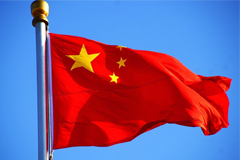 |
China’s premature rise to great power Liselotte OdgaardApril 1, 2007 China’s so-called rise to great power status is usually taken for granted. Still, a convincing argument can be made that Beijing’s post-Cold War grand strategy is based on fear of failure rather than management of success. |
 |
Can scientific codes of conduct deter bioweapons? Jeanne Guillemin, MITApril 1, 2007 At least since the First World War, when the German army sabotaged the Allies’ pack animals with anthrax and glanders, worldwide concern about biological weapons has focused on how to improve legal restraints against biological weapons (BW). Over these same years, the major powers have vacillated in their willingness to promote international treaties and laws against BW programs. |
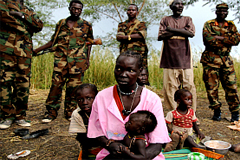 |
Sudan at the crossroadsFrances M Deng, MITMarch 1, 2007 There is a tendency in the outside world to see the tragedy in the Darfur region of the Sudan in isolation from the regional conflicts that have been proliferating in the country for a half century. These conflicts reflect an acute crisis of national identity that is both a cause of genocidal wars and a factor in the state’s indifference to the resulting humanitarian consequences. |
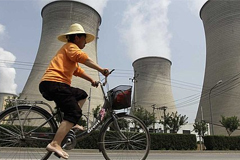 |
China’s energy governance: perception and reality Edward A Cunningham, MITMarch 1, 2007 As observers outside of China warn of a looming Chinese end game in global energy assets, manipulated by Beijing, leading policymakers inside of China are facing considerable challenges governing major energy companies—especially those that the state owns. |
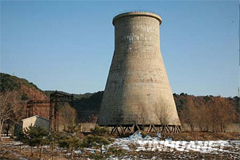 |
North Korea: negotiations work Leon V Sigal, Social Science Research CouncilFebruary 1, 2007 In a laudable about-face, President Bush has decided at last to accept North Korea’s longstanding offer to suspend production of plutonium by shutting down and sealing its reactor and reprocessing plant at Yongbyon, halting construction of a larger reactor and not restarting a newly refurbished fuel fabrication plant. |
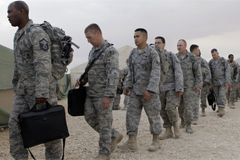 |
Troop levels in stability operations: what we don’t know Peter JP Krause, MITFebruary 1, 2007 Troop levels in Iraq have been one of the most hotly contested issues in American foreign policy over the past three years, from debates over the initial deployment in 2003 to those surrounding the troop surge in 2007. |
 |
Iraq’s political factions: the last chance to build a governing coalition? Barry R Posen, MITJanuary 2, 2007 President Bush is renewing his effort to create an Iraq that can govern, sustain, and defend itself, and is throwing more resources at the project. The first priority must be governance, however, as administration and defense cannot happen without a functioning government. |
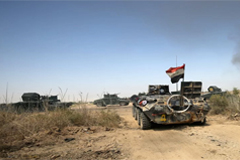 |
Regionalizing the Iraq conflict? John Tirman, MITDecember 1, 2006 In one way or another, we are headed for a new engagement with the regional players to in an effort end the Iraq war. The idea of bringing in the neighbors to help stabilize and reduce the violence in Iraq is very attractive, and could contribute to a plausible exit strategy for the United States. |
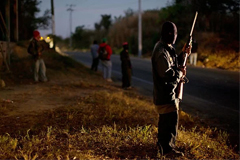 |
Violence and insecurity: the challenge in the global south Diane Davis, MITNovember 1, 2006 It does not seem that long ago that optimism flowered about prospects for democracy and sustained economic development on a worldwide scale. But hopes for the future have dimmed over the last several years, as problems of violence, crime, and insecurity have emerged with a vengeance in many parts of the global south. |
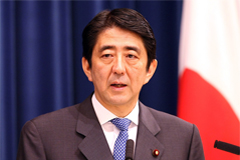 |
Waiting for Goldilocks: getting Japan’s foreign policy just right Richard J Samuels, MITOctober 1, 2006 This metaphor captures the challenges awaiting Abe Shinzo, Japan’s new prime minister very nicely—particularly in the areas of foreign and security policy. His predecessor, Koizumi Junichiro, had already been like Goldilocks in his extended effort to find just the right policy toward North Korea. |
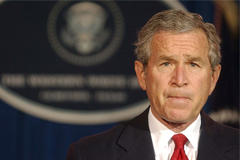 |
The Bush Administration is Weak on Terror Stephen Van Evera, MITOctober 1, 2006 The U.S. public widely credits President Bush with toughness on terror. An August 2006 poll found 55 percent of Americans approving his handling of the campaign on terror and only 38 percent disapproving. Republican candidates are running successfully on the terror issue in this fall’s election campaign. In fact, the Bush administration is weak on terror. |
 |
The war on terror: forgotten lessons from World War IIStephen Van Evera, MITOctober 1, 2006 President Bush recently likened the war on terror to the struggles Americans faced in World War II, explaining that our enemies are “successors to Fascists, to Nazis ... and other totalitarians of the 20th century.” The analogy to World War II is useful and illuminating. Important lessons from World War II apply to the war on terror. |
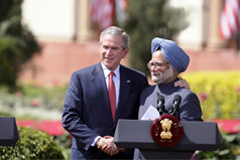 |
The US-India Nuclear Deal: Triumph of the Business Lobby Subrata Ghoshroy, MITSeptember 1, 2006 Much has been written and spoken about the US-India nuclear agreement since Prime Minster Manmohan Singh and President George W. Bush unveiled it on July 18, 2005, in Washington, DC. Since then, the U.S. Congress has virtually set aside its much touted concerns about proliferation of nuclear weapons and is nearly ready to approve the amendments to the 1954 Atomic Energy Act that will be necessary for the deal to be consummated. |
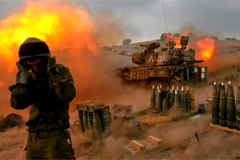 |
Channel surfing: non-engagement as foreign policy Barbara Bodine, MITAugust 21, 2006 The adoption of Security Council Resolution 1701 brought a halt to the month-long Israeli-Hezbollah war. UNIFIL will be greatly expanded with a more vigorous mandate to back Lebanese assertion of full sovereignty and control over southern Lebanon and the disarmament of Hezbollah’s militia and missile sites. But is an agreement hammered out in Manhattan sustainable on the ground? |
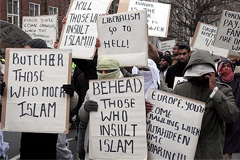 |
Why do Islamist groups become transnational and violent? Quinn Mecham, Middlebury CollegeAugust 1, 2006 Since al-Qaeda’s rise to prominence as the most commonly recognized Islamist group worldwide, Islamist movements are increasingly viewed as violent, transnational organizations. Most Islamist groups, however, are actually non-violent and focused on the domestic audience of their home countries. |
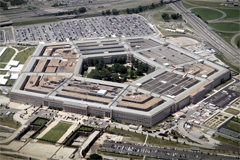 |
Budgets to make America saferCindy Williams, MITJune 1, 2006 Since September 2001, federal budgets for national security have climbed more than 50 percent in real terms. Unfortunately, much of the added money reflects “business as usual” rather than programs aimed at making the nation safer from today’s threats. |
 |
Immigration and insecurity: post-9/11 fear in the United StatesJohn Tirman, MITJune 1, 2006 The attacks of September 11, 2001, transformed the landscape of global security, none more than borders and immigration. The topography of citizenship, belonging, and suspicion instantly changed for Arab and Muslim communities in the United States. They drew the sharp attention of U.S. law enforcement and intelligence services, and that continues. |
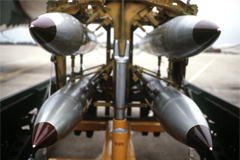 |
A double standard on nuclear weapons?Hugh Gusterson, MITApril 1, 2006 There has long been a widespread perception among U.S. defense intellectuals, politicians and pundits that, while we can live with the nuclear weapons of the five official nuclear nations for the indefinite future, the proliferation of nuclear weapons to nuclear-threshold states in the Third World, especially the Islamic world, would be enormously dangerous. This orthodoxy is so much a part of our collective common sense that, like all common sense, it can usually be stated as simple fact without fear of contradiction. |
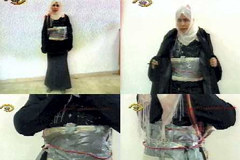 |
Human bombs: rethinking religion and terrorNichole Argo, MITApril 1, 2006 Suicide terror has become a daily news staple. Who are these human bombs, and why are they willing to die in order to kill? Many observers turn to Islam for an explanation. They cite the preponderance of Muslim bombers today, indoctrination by extremist institutions, and the language used in jihadi statements. |
 |
The War on Terror and the Cold War: they're not the sameJohn Tirman, MITApril 1, 2006 Since the autumn of 2001, following the shocking attacks of September 11th, President Bush and his advisers have repeatedly likened the war against terrorism to the confrontation with Nazi Germany in the Second World War and the long struggle with Soviet communism in the Cold War. But the current anti-terrorist campaign and the related war in Iraq are significantly different from those earlier contests. |
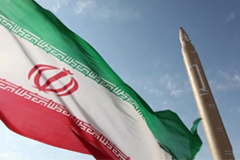 |
We can live with a nuclear IranBarry R. Posen, MITMarch 1, 2006 The intense concern about Iran's nuclear energy program reflects the judgment that, should it turn to the production of weapons, an Iran with nuclear arms would gravely endanger the United States and the world. Indeed, while it's seldom a positive thing when a new nuclear power emerges, there is reason to believe that we could readily manage a nuclear Iran. |
 |
Remittances: Latin America's faulty lifeline Catherine Elton, MITMarch 1, 2006 In recent years, the money that migrants send back to their native countries has become a hot topic in international development circles. Multilateral banks, the governments of migrant-sending nations, the U.S. Government, and international development organizations laud the potential that remittances have to reduce poverty and promote development. Remittances are being exalted as “the new development finance,” and a ticket to “high human development,” while the migrants who send them are hailed as heroes back home. |
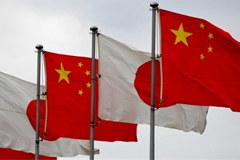 |
Japan-China relations: four fallacies masquerading as common senseKazuo Ogoura, Japan FoundationMarch 1, 2006 To gain insight into the future of the Sino-Japanese relationship, we need to clear up the misconceptions, misunderstandings, and errors that beset the two countries’ relations and take an intellectual scalpel to their source. Some of the errors are related to the way people think about or perceive themselves, while others stem from the thinking or attitudes of the other party; still others are linked to the history of Japan-China relations. |
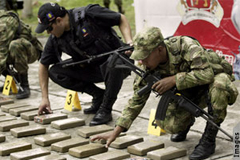 |
A better strategy against narcoterrorismVanda Felbab-Brown, MITJanuary 1, 2006 It is widely recognized that access by belligerent groups to the gains from drug production and trafficking contributes to the intensity and prolongation of military conflict. Also, that such groups—terrorists, insurgents, or warlords—grow stronger when they successfully exploit the drug trade. The United States’ response—its antinarcotics policy—emphasizes crop eradication. |
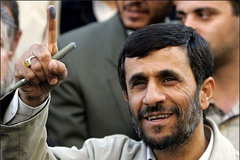 |
Is Iran's reform movement dead?Fatemeh Haghighatjoo, MITJanuary 1, 2006 The surprise victory of Mahmoud Ahmadinejad in the Iranian Presidential election last June brings up the question of whether the reform movement is dead in Iran. Does Ahmadinejad’s success imply that Iranians have economic demands only? Who now are the supporters of reform? |
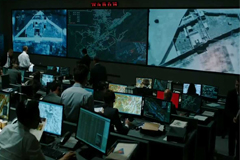 |
Why intelligence isn't to blame for 9/11 Joshua Rovner, MITNovember 1, 2005 It did not take long for blame for the September 11 attacks to cascade onto the intelligence community. But it is not deserved, and the reasons for that are important. |
 |
The hidden cost of homeland defense Benjamin FriedmanNovember 1, 2005 Conventional wisdom says that none of us are safe from terrorism. The truth is that almost all of us are. The conventional belief is that in response to terrorism, the federal government has spent massive sums on homeland security. The fact is that the increased federal spending on homeland security since September 11 pales in comparison to increases in the U.S. defense budget. But homeland security has costs beyond spending, costs that conventional thinking rarely considers. |
 |
Iran: rogue state?Ali Mostashari, MITSeptember 1, 2005 Iran is now an important focal point for U.S. foreign policy. Yet many have argued that the United States lacks a coherent foreign policy on Iran, amounting to no more than an enormous list of “evils”: namely, that Iran exports its radical Islamist revolution, supports Hezbollah and Hamas and actively opposes the Middle East peace process, is building nuclear and biological weapons capacity, was involved in the bombings of the Jewish center in Buenos Aires and the Khobar towers in Saudi Arabia, provides Al-Qaeda with safe passage and refuge, helps insurgents in Iraq, assassinates its own dissidents and oppresses its people, and so on. |
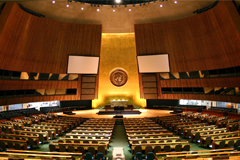 |
Who needs the UN?Gary G. Troeller, MITSeptember 1, 2005 There has long been a feeling in the corridors of power in Washington that the United Nations is irredeemably flawed and condemned to ineffectiveness. It is viewed as an irritating constraint on U.S. power, or worse—expensive, wasteful, slow to act, and irrelevant. |
 |
The mirage of a united EuropeRobert Vickers, MITSeptember 1, 2005 To most Americans, the prospect of a united Europe has long been viewed not only as a favorable development, but even as an increasingly inevitable one. Our common political, religious and cultural heritage, democratic governments, market economies, and Cold War experiences have all contributed to the perception of Europe as a friend and natural ally of the United States, occasional differences not withstanding. |
 |
All weapons of mass destruction are not equal Allison Macfarlane, MIT July 1, 2005 In the United States, weapons of mass destruction have become the bête noir of the 21st century. They are now the justification for pre-emptive war, for an expansion of the cold war nuclear arsenal, and for the spending of billions of dollars on offensive and defensive measures. Since significant portions of U.S. foreign and domestic policy are based on this categorization, it is high time to reflect on whether these weapons pose such a lethal threat. |
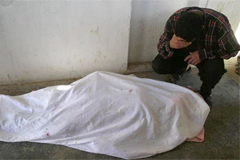 |
The Iraq War: do civilian casualties matter? Les Roberts, MITJuly 1, 2005 A disturbing thing happened to me in Afghanistan last May while working on a project to install wells in villages. After a delightful month of working in a rural province, filled with welcoming leaders and offers of tea at every house, the mood suddenly changed. A young man walked up to my 42-year-old female American colleague and bashed her in the face. As we collected our interviewers and headed back to the vehicles, children from the village pelted us with stones. This violence against anything foreign played out in hundreds of locations across Afghanistan that day. |
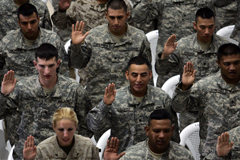 |
Filling the army's ranks for the Iraq War Cindy Williams, MITJuly 1, 2005 Some two years into the occupation in Iraq, the U.S. Army faces a serious staffing challenge. As of May 30, 2005, the active-duty Army had missed its recruiting goals for four months in a row. If things do not improve substantially, the service will have only 10 percent of needed enlistees pre-signed for basic training at the beginning of 2006; normally it begins the year with about one-third of its trainees already committed to contracts. |
 |
Why US national security requires mideast peace Stephen Van Evera, MITApril 1, 2005 Two myths have important, distorting effects on the Bush administration's policy toward the Israeli-Palestinian conflict. First is the optimistic belief that the Israeli-Palestinian conflict is only a minor obstacle to American foreign policy—a modest hindrance that will not prevent the United States from achieving its main foreign policy goals. Second is the pessimistic belief that a final settlement between Israel and the Palestinians is infeasible, so a forceful U.S. push for peace will only waste effort on a fool’s errand. |
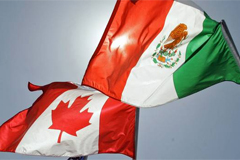 |
Raising the salience of Mexico and CanadaChappell Lawson, MITApril 1, 2005 Canada and Mexico rarely figure high on the list of American priorities. Policymakers focus on conflicts in the Middle East; specialists in international relations discuss China’s growing influence; and newspapers cover the international crisis du jour. It is easy to forget about two countries that appear to pose no direct or immediate threat to U.S. interests. |
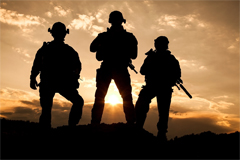 |
US military power: strong enough to deter all challenges? Barry R. Posen, MITApril 1, 2005 How strong is the U.S. militarily? Recent history would suggest very strong indeed—the U.S. armed forces are undefeated in two stand-up fights with Saddam Hussein, and one each with Slobodan Milosevic and the Taliban. The Grand Strategy of the Bush administration seeks to improve this already impressive position. |
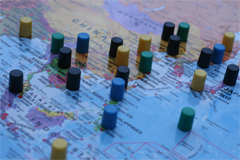 |
The United States as an Asian power: realism or conceit?M. Taylor Fravel and Richard J. Samuels, MITApril 1, 2005 The long history of U.S. foreign policy is punctuated by axiomatic truths that have bordered on conceit—e.g., the virtues of isolation, America’s manifest destiny, and our benign, democratizing presence in world affairs. Strategists have lurched from truth to truth across the centuries, often without sufficient reflection and learning. Today the United States is operating with an axiomatic idea about its place in and of Asia. |
 |
Introducing a seriesApril 1, 2005 Politics and public policy, like every walk of life, are fraught with “conventional wisdom”—the folk axioms, bromides, platitudes, and generally superficial explanations that, once entrenched, go unchallenged. Academics, journalists, activists, business leaders and just about everyone else in the chattering classes—right, left, and center—are guilty parties. All of us use conventional wisdom as a shortcut—as a handy way to “know” something about which we have not invested the time and trouble to study closely and understand fully |



